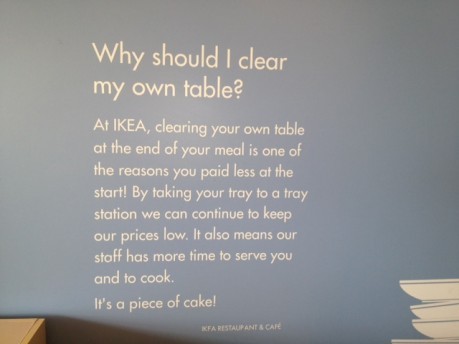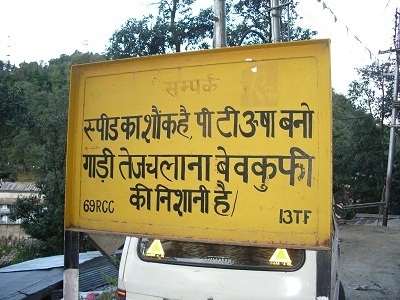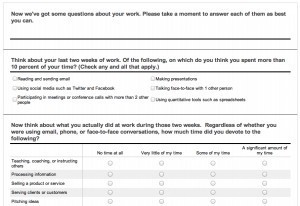Daniel H. Pink's Blog, page 7
June 18, 2012
Emotionally intelligent signage amid the meatballs
Last week, Mrs. Danpink.com and one of our kids ventured to the IKEA store in College Park, Maryland. They returned with a hard-to-assemble bookshelf, a ginormous bag of Swedish meatballs, and a great example of emotionally intelligent signage from the store cafeteria.
June 11, 2012
Yes, smart phones are actually underhyped
 Last month, toward the end of an on-stage conversation at Wired’s Disruptive by Design Conference, Mark Andreesen (he of the Mosaic browser, giant venture fund, and shiny, egg-shaped pate), unleashed a corker.
Last month, toward the end of an on-stage conversation at Wired’s Disruptive by Design Conference, Mark Andreesen (he of the Mosaic browser, giant venture fund, and shiny, egg-shaped pate), unleashed a corker.
The smart phone revolution, he said, is under-hyped. “We have never lived in a time with the opportunity to put a computer in the pocket of 5 billion people.”
Techno-bluster?
Maybe not.
Technology Review has a fascinating piece chock-a-block with startling factoids (emphasis added):
In 2006, smart phones accounted for just 6% of U.S. mobile phones sold that year. Today, “smart phones represent more than two-thirds of all U.S. mobile-phone sales.”
“In 1982, there were 4.6 billion people in the world, and not a single mobile-phone subscriber. Today, there are seven billion people in the world — and six billion mobile cellular-phone subscriptions.” Of those subscriptions, 73 percent are now in the developing world, even though those countries account for just 20 percent of the world’s GDP.”
“According to IDC, smart phones accounted for 36 percent of global mobile-phone shipments in the first quarter of 2012, up from 25 percent a year earlier. If smart phones continue to gain at even this pace, ‘feature phones’ will be largely a memory in another five years.”
Right now the world has 1.4 billion PCs in use. “Mobile phones, on the other hand, are already selling more than 1.4 billion units every single year.”
The moral of the story: As always, ignore Andreesen at your peril.
May 31, 2012
3 cheap and effective productivity apps
Need a life-hack fix? Got a couple bucks? Here are three cool iPhone apps that will help you track your journeys, value your time, and meet your goals:
 The first app is the delightfully named Wonderful Day. The idea is similar to Jerry Seinfeld’s ruthlessly elegant productivity tip. Set up your goal in Wonderful Day (I’ve established two: running at least 3 miles and writing at least 400 words). Wonderful Day will send you a single daily reminder — not a riot of beeps and buzzes — and when you accomplish your task, you mark it as done in the app. After a few days, you’ll see a chain of green dots next to your goal. The longer the chain grows, the more reluctant you’ll be to break it with a dreaded red dot indicating that you haven’t done what you set out to do. A very sensible 99-cent investment.
The first app is the delightfully named Wonderful Day. The idea is similar to Jerry Seinfeld’s ruthlessly elegant productivity tip. Set up your goal in Wonderful Day (I’ve established two: running at least 3 miles and writing at least 400 words). Wonderful Day will send you a single daily reminder — not a riot of beeps and buzzes — and when you accomplish your task, you mark it as done in the app. After a few days, you’ll see a chain of green dots next to your goal. The longer the chain grows, the more reluctant you’ll be to break it with a dreaded red dot indicating that you haven’t done what you set out to do. A very sensible 99-cent investment.
 The next is Replay My Day, a $1.99 app that captures your Facebook updates, Tweets, photos, notes, just about anything else you want and plots them by location. Its creator calls the result “a magic diary.” The magic part is that you can then replay any of your recorded days like a mini-movie, traveling back in time and space to relive those moments as you recorded them. You could use it, say, to remember a family vacation — but it might also have business applications. How about using Replay My Day to compile research for a book or article? Salespeople could use it to track their customer visits. A farm-to-table entrepreneur could record the travels of a turnip to your dinner plate. Imagine if Leopold Bloom had had this app in his pocket.
The next is Replay My Day, a $1.99 app that captures your Facebook updates, Tweets, photos, notes, just about anything else you want and plots them by location. Its creator calls the result “a magic diary.” The magic part is that you can then replay any of your recorded days like a mini-movie, traveling back in time and space to relive those moments as you recorded them. You could use it, say, to remember a family vacation — but it might also have business applications. How about using Replay My Day to compile research for a book or article? Salespeople could use it to track their customer visits. A farm-to-table entrepreneur could record the travels of a turnip to your dinner plate. Imagine if Leopold Bloom had had this app in his pocket.
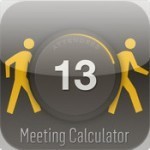 The last app offers fun and insight — with a bite. Ever wonder what all those meetings are costing your company? With MeetingCalc, you’ll get your answer. Enter the hourly rate of each person in the meeting, and at the end of the meeting the app will tabulate the total cost. Say you’re in a meeting with nine co-workers who average $60 an hour, and 15 minutes are wasted fumbling with the laptop and projector. That just cost your company $150! The beauty of MeetingCalc, which costs just 99 cents, is that you can then share the results — with the whole world via Twitter, if you want. However, some people would consider that a waste of time.
The last app offers fun and insight — with a bite. Ever wonder what all those meetings are costing your company? With MeetingCalc, you’ll get your answer. Enter the hourly rate of each person in the meeting, and at the end of the meeting the app will tabulate the total cost. Say you’re in a meeting with nine co-workers who average $60 an hour, and 15 minutes are wasted fumbling with the laptop and projector. That just cost your company $150! The beauty of MeetingCalc, which costs just 99 cents, is that you can then share the results — with the whole world via Twitter, if you want. However, some people would consider that a waste of time.
May 21, 2012
A great idea needs a new name. Want to help?
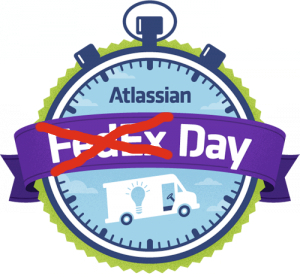 One of the best ideas I’ve heard in the last 10 years is the FedEx Day. Created by the Australian software company Atlassian, FedEx Days give people 24 hours to work on whatever they want — so long as it’s not part of their regular jobs and provided that they show what they’ve created to their colleagues when the 24 hours elapse.
One of the best ideas I’ve heard in the last 10 years is the FedEx Day. Created by the Australian software company Atlassian, FedEx Days give people 24 hours to work on whatever they want — so long as it’s not part of their regular jobs and provided that they show what they’ve created to their colleagues when the 24 hours elapse.
Why the name? Because you have to deliver something overnight.
FedEx Days have been hugely successful in generating new products, fashioning fixes to existing products, and improving internal processes. That’s one reason why they have spread like kudzu in recent years. But now, Atlassian says in a blog post, the name must change.
It turns out that FedEx, which had absolutely no connection to its eponymous days, has asked Atlassian to choose a new name. They weren’t jerks about it. No growling lawyers or menacing cease-and-desist letters. FedEx* just said essentially, “Hey, it’s our brand, not yours. So if you don’t mind, come up with something else.”
Atlassian is now trying to find that something else. And the company, a true pioneer of leading-edge work practices, has reached out to its loyal base of customers and blog readers for suggestions.
If you have a cool new name for this cool semi-new innovation, visit the Atlassian site and offer your idea. You’ve got until May 23 at midnight PDT. But I beg you: Please don’t suggest “UPS Days.”
*(Full disclosure: I’m a fan of FedEx — both because of my experiences as a customer and because FedEx founder Fred Smith called me a few months ago to tell me he liked Drive.)
May 16, 2012
3 more emotionally intelligent ways to keep streets safe
As always, the mailbag of emotionally intelligent signage is brimming with examples sent by readers around the world. And as always, the most prevalent target of this new approach to sign and symbol is dangerous driving. Here are three that caught my eye:
A homemade sign from a tough-minded (but not litigious) parent:
An official sign from the hilly state of Himachal Pradesh in northeast India:
(If your Hindi is rusty, this translates to “If you fancy speed, become PT Usha. Speed driving is a sign of stupidity.” If your Indian sports history is rusty, PT Usha is one of the fastest runners the country has ever produced.)
And a new-fangled centaur-style police car that’s apparently being widely used in Texas to deter drunk driving.
(HT: Jeremy Epstein, R. Ganesh, and Chris Nute)
May 11, 2012
Ask Tom Peters anything you want — only on Office Hours
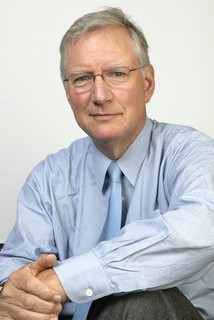 Our next guest on Office Hours is none other than Tom Peters — the peripatetic and perspicacious co-author of In Search of Excellence and the man The Los Angeles Times called “the father of the post-modern corporation.”
Our next guest on Office Hours is none other than Tom Peters — the peripatetic and perspicacious co-author of In Search of Excellence and the man The Los Angeles Times called “the father of the post-modern corporation.”
Join us on Monday, May 14 at 2pm, EDT, for what promises to be a terrific Office Hours episode. I’ll talk with Tom about the state of the economy, the new rules of work, and his recently released “mother of all presentations.” And as always, you’ll be able to call in and ask him anything you want.
(Don’t know what Office Hours is?
Click here. Or repeat after me: “It’s Car Talk . . . for the Human Engine.”)
To listen live, just dial 703.344.2171 and enter the passcode 203373 on Monday at 2pm, EDT. We’ll give you directions for how to ask your questions during the hour.
If you’ve never heard Tom before, you’re in for a treat. If you’ve never asked him a question, you’re in for an education.
You can listen to some of our past shows, featuring guests like Marcus Buckingham, Jim Collins, Jonah Lehrer, and Susan Cain, on the Office Hours page. You can also subscribe on iTunes.
May 8, 2012
Can you launch a startup with just 100 bucks?
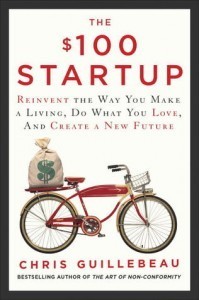 Later this month, Facebook is planning a ninety billion dollar IPO. Let’s write out that number so we glimpse its enormity: $90,000,000,000. Whoa.
Later this month, Facebook is planning a ninety billion dollar IPO. Let’s write out that number so we glimpse its enormity: $90,000,000,000. Whoa.
Chris Guilliebeau thinks Facebook is cool. But he urges the rest of us to concentrate on a smaller number: a hundred bucks. Let’s write out that one, too. $100. See? It’s a lot more manageable.
In his new book, The $100 Startup: Reinvent the Way You Make a Living, Do What You Love, and Create a New Future, (Buy it on Amazon , BN.com, or IndieBound), Guillebeau examines a slew of people who’ve started enterprises with extremely modest investments — and managed to build both a business and life.
, BN.com, or IndieBound), Guillebeau examines a slew of people who’ve started enterprises with extremely modest investments — and managed to build both a business and life.
With the book launching today, Chris agreed to answer some questions for Pink Blog readers about risk, reward, and revolution.
***
1. In the book, you talk about the freedom of leaving a soul-sucking job to begin an entrepreneurial adventure. It sounds wonderful, but in rough economy, why would someone with a steady job want to take a chance on self-employment?
In a time of uncertainty, many of us are thinking about security and redefining risk. I don’t believe that pursuing self-employment is “taking a chance,” at least not compared to taking a chance in a highly competitive, difficult job market that offers few opportunities for independence. Many of the people I talked with for the book found that their own competence was their best security.
Furthermore, lots of big businesses—Microsoft, GE, and HP to name a few—were all started during recessions. So in my mind, while there are certainly some bad things about an economic downturn, there is also a great deal of opportunity.
2 . What is one thing Pink Blog readers could do today to take that first step on the road to freedom?
I bet that the astute Pink Blog readership has a lot of ideas for a business. Some of them are probably great ideas, but one thing I’ve learned is that most “business ideas” are actually too general. So the one thing these astute readers can do is convert that general idea into a specific offer. What will you actually offer the world, and how will you get paid for it?
Starting a business isn’t that complicated. You don’t need an MBA or a 60-page business plan that no one will ever read. You do, however, need a few things:
a) A product or service
b) A group of people willing to buy it
c) A means of getting paid
When thinking about business ideas, always think in this framework: what it is, who it’s for, and how you’ll get paid?
3. Anything they should not do?
Yes. Don’t feel like you have to have everything in place before starting. I often hear from people in cubicle-land who want to “quit their jobs” but have concerns about income and providing for others. These are valid concerns!
So if that’s your situation, don’t quit. But don’t wait in paralysis either. The sooner you can create a side project that will bring in some extra cash, the better. A little extra cash from an all-new source can be highly empowering. It creates the potential that, one day, you may indeed be able to walk away from that soul-sucking job.
May 2, 2012
3 outstanding books for your spring reading list
Over the last few months, I’ve had the privilege of reading three truly outstanding books. None are about business or work per se — but all are amazing and worth your time.
 The first is Katherine Boo’s Behind the Beautiful Forevers: Life, Death and Hope in the Mumbai Undercity. Boo, , spent three years observing life in a slum adjacent to the airport in Mumbai, India. She returned with a riveting story that’s centered around a self-immolation and ensuing false accusations, but is ultimately about family, poverty, justice, and being human. This work of non-fiction is as gripping as a classic novel, a book that people will be reading for many years. (Amazon) (BN.com) (IndieBound)
The first is Katherine Boo’s Behind the Beautiful Forevers: Life, Death and Hope in the Mumbai Undercity. Boo, , spent three years observing life in a slum adjacent to the airport in Mumbai, India. She returned with a riveting story that’s centered around a self-immolation and ensuing false accusations, but is ultimately about family, poverty, justice, and being human. This work of non-fiction is as gripping as a classic novel, a book that people will be reading for many years. (Amazon) (BN.com) (IndieBound)
 Instant City: Life and Death in Karachi, by NPR journalist Steve Inskeep, hasn’t gotten as much press as Boo’s book — but it’s just as good. Instead of Mumbai, Inskeep takes us to Karachi, Pakistan — and describes how a once-sleepy enclave became a sprawling 13 million person metropolis, rife with violence, terror, and even a little hope. The reporting is so rich and the writing so vivid, you can almost smell the streets. Instant City deserves to be a huge bestseller. (Amazon) (BN.com) (IndieBound).
Instant City: Life and Death in Karachi, by NPR journalist Steve Inskeep, hasn’t gotten as much press as Boo’s book — but it’s just as good. Instead of Mumbai, Inskeep takes us to Karachi, Pakistan — and describes how a once-sleepy enclave became a sprawling 13 million person metropolis, rife with violence, terror, and even a little hope. The reporting is so rich and the writing so vivid, you can almost smell the streets. Instant City deserves to be a huge bestseller. (Amazon) (BN.com) (IndieBound).
Then there’s Billy Lynn’s Long Halftime Walk by Ben Fountain.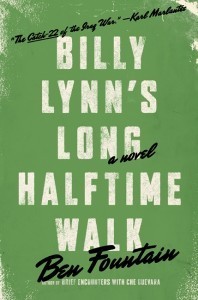 Here’s the high concept pitch: Catch-22 meets Tom Wolfe . . . for the Iraq War. Billy Lynn is a Army private just back from a firefight in Iraq, the video of which has gone viral thanks to Fox News and the Internet. Over the course of a Dallas Cowboys Thanksgiving football game, Billy encounters all manner of American weirdness. A Hollywood producer, drunken soldiers, rapacious capitalists, an amorous cheerleader, inert and clueless citizens, even Beyonce. This is one of the best novels I’ve read in years. (Amazon) (BN.com) (IndieBound)
Here’s the high concept pitch: Catch-22 meets Tom Wolfe . . . for the Iraq War. Billy Lynn is a Army private just back from a firefight in Iraq, the video of which has gone viral thanks to Fox News and the Internet. Over the course of a Dallas Cowboys Thanksgiving football game, Billy encounters all manner of American weirdness. A Hollywood producer, drunken soldiers, rapacious capitalists, an amorous cheerleader, inert and clueless citizens, even Beyonce. This is one of the best novels I’ve read in years. (Amazon) (BN.com) (IndieBound)
April 30, 2012
Travel Tip #12 — Never get sick again . . . again
It’s been awhile. But here — in response to astonishingly meager demand — is a new Travel Tip. (To be fully prepared, it’ll help to have seen this one.)
PREVIOUS TIPS:
Tip #1 — Never get sick again
Tip #2 — The magic of earplugs
Tip #3 — Four road food rules of thumb
Tip #4 — The rule of HAHU
Tip #5 — More hygiene!
Tip #6 — Staying connected
Tip #7 — Zipping through security lines
Tip #8 — One thing you should never do in a hotel room
Tip #9 — The secret(s) to beating jet lag
Tip #10 — The first thing you should buy
Tip #11 – The hidden benefits of Mickey D’s
April 26, 2012
Do you have 4 minutes to help me learn what people do all day at work?
To write my previous books, I relied on tons of interviews, lots of traditional library and online research, and one kick-ass genie.
For the next book, I’m adding a new technique: Quantitative survey research. In an effort to add some statistical meat to the book’s analytic bones, I’ve enlisted the wonderful folks at Qualtrics and devised a brief survey on people’s work activities and attitudes.
Thanks to a bunch of tweets on Tuesday, several thousand people have already completed the survey. But because we’re working hard to make sure we have a fully representative sample, and because the huge response has given us a chance to assemble even representative subgroups, we’re looking for more participants.
If you’re interested in adding your experiences and opinions to the new project, just go to this link. The survey begins with some demographic questions to ensure we have valid sample. Then it moves to a handful of questions about how you spend your time at work — and what you think of certain aspects of it.
People who’ve completed the survey have said they’ve enjoyed it. And, seriously, it takes just four minutes.
So if you’ve got 240 spare seconds, give it a try. It would be a huge help.

